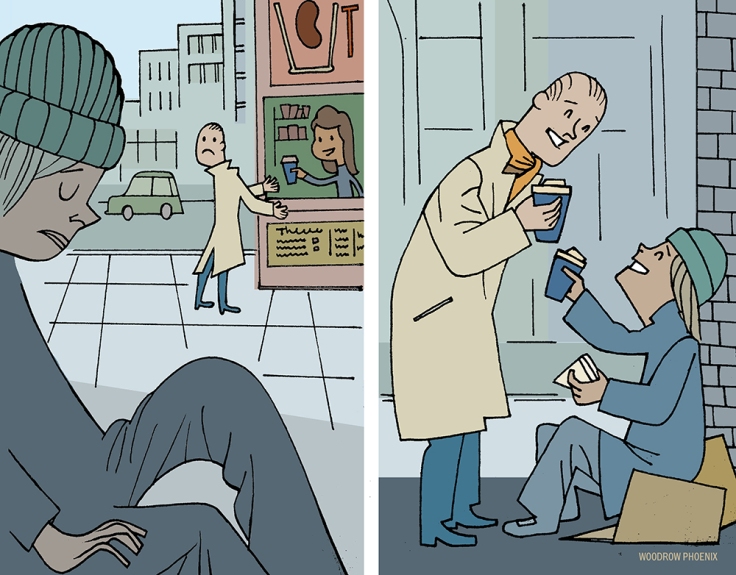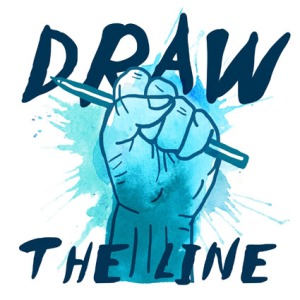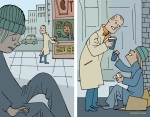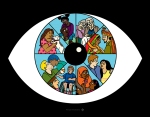We all want it. Let’s do something — large or small — to make it happen.
Click any of the images to see them at a larger size.

DIG DEEPER
Have conversations that help you understand the opposite points of view.
Knowledge is power, and what’s more, a little understanding makes for much more useful dialogues.
The internet is already full of people throwing insults at those who hold opposing views. Let’s genuinely try and understand where they’re coming from.
Image by Rakel Stammer

SEE PEOPLE AS PEOPLE
The charity Streets of London say that we must “challenge the perception that homeless people are any different from the rest of us. Homelessness begins when something bad happens and you don’t have family or friends around to help. It could happen to any of us.”
The same logic can be applied across many sectors of society: they may be temporarily disadvantaged, but they are people.
Image by Woodrow Phoenix

LOOK FOR THE REASON
Most human beings don’t just hate for no reason: they have a narrative that explains their beliefs.
Perhaps they see a link between the immigrants coming into their town and the fact that they can’t get a job or a house.
Maybe a strong religious upbringing implanted a fear of alternative sexualities, and a belief that they are doing harm in the world.
Once we begin to understand the reasons for beliefs, we can also understand how to change them. We might even find that there are some valid grievances underlying the rhetoric — tackle those and let’s see what happens.
Image by David Blumenstein

REPRESENT EVERYONE
If you’re an artist who includes characters in their work (from cartoonist to scriptwriter to designer), make sure that you depict all kinds of people.
By showing characters who are disabled, non-heteronormative, from religious or ethnic minority backgrounds and so on, you can play a huge part in the public’s perception that all types of people as unremarkable or sympathetic.
Image by Kripa Joshi

SHARE YOUR EXPERIENCES
Trying to make a better world?
Write a blog as you go about it. Sharing your experiences with the world sets a precedent, and normalises them for the next person thinking of doing the same.
Image by Richy K. Chandler

WALK THE STREETS
It’s really easy to organise a march or a demonstration these days, thanks to social media. So, get everyone out on the streets and let’s shout about injustice.
Image by Simon Russell

BEAR WITNESS
The work of comic artists like Olivier Kugler and Kate Evans show us that documentary or reportage drawing can be a powerful tool.
As comic artists we might feel that we don’t have much to offer when faced with gross injustices, poverty, or warfare. But we can tell stories, and in a very immediate way.
A way that can change minds, soften hearts, even alter the political discourse.
Image by Sousa Machado Arts

FOLLOW THE MONEY
You work hard for your money, so the last thing you want is some dodgy corporation using it to fund something you’re opposed to.
Banks can use your money to invest for their own profits, so find out if your bank is putting it into, say, the arms trade, fossil fuels or businesses that use slave labour.
Then close that account and tell other people what you’ve done. And remember to tell your bank: “It’s not me, it’s you”.
In the US, the Sacred Stone Camp, campaigning against the Dakota Access Pipeline, called on people not just to close down their accounts if their bank was funding the pipeline, but to take a picture of themselves doing so and spread it far and wide via social media. They recommended putting the withdrawn funds into a credit union, a non-profit co-operative run for its members.
Image by Guin Thompson

RAISE A BETTER GENERATION
Kids are the voters of tomorrow. Let’s make sure they have some solid values and a good understanding of the way the world works.
Talk to them about unfairness in the world. Teach them equality and understanding. Help them to understand their own rights, and the rights of others. Let them know that our elected representatives are available, and how to access them when we need them.
If you feel a political figure has let you down, tell your child about that too: people are fallible, even those in power, and that’s an important lesson to learn.
Image by Rosa Devine

BREAK THE LAW
Depending on where in the world you live, aggravated trespass, obstructing the police or criminal damage are offences for which you may risk arrest, a fine or even imprisonment.
But in the UK, it’s worth remembering that the defence of “preventing a greater crime” can hold good in Crown Court. That greater crime might, arguably, be genocide, global warming, poisoning of the water system… or many others.
Yes, you may wish to check with a good lawyer before you cross the line, but take heart from the Ploughshares activists, who walked free after damaging Hawk Jet planes in order to prevent them from bombing East Timor.
 This action contravenes the law (obviously, in this case): proceed with caution.
This action contravenes the law (obviously, in this case): proceed with caution.
Image by Kate Evans
 All artwork on this page is licensed under a Creative Commons Attribution-NonCommercial-ShareAlike 4.0 International License.
All artwork on this page is licensed under a Creative Commons Attribution-NonCommercial-ShareAlike 4.0 International License.
DIG DEEPER
Have conversations that help you understand the opposite points of view.
Knowledge is power, and what’s more, a little understanding makes for much more useful dialogues.
The internet is already full of people throwing insults at those who hold opposing views. Let’s genuinely try and understand where they’re coming from.
Image by Rakel Stammer
SEE PEOPLE AS PEOPLE
The charity Streets of London say that we must “challenge the perception that homeless people are any different from the rest of us. Homelessness begins when something bad happens and you don’t have family or friends around to help. It could happen to any of us.”
The same logic can be applied across many sectors of society: they may be temporarily disadvantaged, but they are people.
Image by Woodrow Phoenix
LOOK FOR THE REASON
Most human beings don’t just hate for no reason: they have a narrative that explains their beliefs.
Perhaps they see a link between the immigrants coming into their town and the fact that they can’t get a job or a house.
Maybe a strong religious upbringing implanted a fear of alternative sexualities, and a belief that they are doing harm in the world.
Once we begin to understand the reasons for beliefs, we can also understand how to change them. We might even find that there are some valid grievances underlying the rhetoric — tackle those and let’s see what happens.
Image by David Blumenstein
REPRESENT EVERYONE
If you’re an artist who includes characters in their work (from cartoonist to scriptwriter to designer), make sure that you depict all kinds of people.
By showing characters who are disabled, non-heteronormative, from religious or ethnic minority backgrounds and so on, you can play a huge part in the public’s perception that all types of people as unremarkable or sympathetic.
Image by Kripa Joshi




